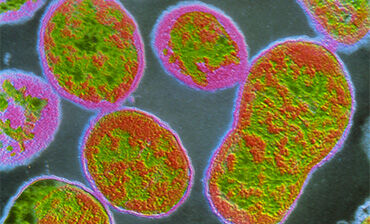Brucellosis

Brucellosis is an infection caused by Brucella bacteria. The common reservoirs for Brucella bacteria that may infect humans are cattle, dogs, sheep, goats, and pigs.
Brucellosis occurs worldwide but the Mediterranean region has been particularly affected. Humans become infected by direct or indirect contact with animals or with contaminated animal products (including unpasteurised milk and dairy products) or by the inhalation of aerosols.
After an incubation period of five to 60 days, symptoms may appear either acutely or insidiously. Untreated, the disease may become chronic.
The various symptoms are both general (fever, weakness, joint pain) and organ-specific (including infections in the brain infection and heart valves). Untreated, brucellosis can lead to death.
Prolonged antibiotic treatment is usually effective. Control measures include animal vaccination and/or test-and-slaughter of infected animals, as well as pasteurisation of milk and dairy products.



